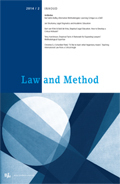|
Thought experiments have been widely used in virtually all sciences and humanities. Law is no exception. We can find countless instances of such experiments in both the legal practice and the legal theory. However, this method has hardly been studied by legal scholars, which contrasts with the vast literature devoted to it in other fields of knowledge. This article analyses the role that some thought experiments – those where an imaginary legal change is made, and its social effects are observed – may play in law. In particular, we show why these empirical legal thought experiments might be useful for the practice and theory of law, the main principles for conducting them and how the law deals with them. |


Law and Method
About this journalSubscribe to the email alerts for this journal here to receive notifications when a new issue is at your disposal.
May, 2021
Expand all abstracts
| Article |
|
| Keywords | legal empirical studies, legal methodology, philosophy of law, thought experiments |
| Authors | Gabriel Doménech-Pascual |
| AbstractAuthor's information |

 Issue 12
Issue 12